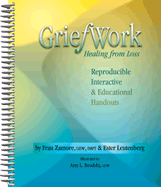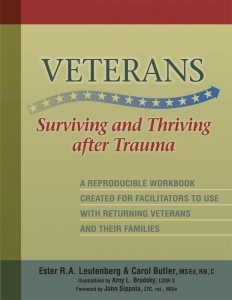Grief and Survival Guilt
As veterans make the transition from deployment to civilian life, from military housing to home, from loneliness to being in the heart of their family they often experience grief and survival guilt. If you are doing this exercise with a group, ask them to share what the phrase “shock and awe” means to them both as a military term and as a generic phrase. If you are doing this exercise alone, journal about what the phrase means to you. Remember, journaling is for your eyes only. Don’t worry about your writing style. Just jot down your thoughts as they come to you.
The death of a comrade in arms or the death of anyone close to you often leads to feelings of being overwhelmed, of not having the strength to go on, of feelings of guilt…why am I here and he/she isn’t.
Read the following with your own feelings in mind.
Excerpted from Veterans: Surviving and Thriving after Trauma
By Ester R. A. Leutenberg and Carol Butler, MS Ed, RN, C
Shock and Awe
Shock and Awe is a military doctrine of rapid dominance; the use of overwhelming power and spectacular force to paralyze the enemy’s perception of the battlefield and destroy their will to fight.
- Shock, disbelief and denial are usually the first reactions to death.
- Awe involves fear and dread, natural reactions to loss, especially sudden death.
- You may grieve the loss of your former identity, the loss of innocence after combat, the loss of a dream if you change careers due to emotional or financial problems, and so on.
The grief process is individualized. Stages have been theorized, but people do not go through all the same stages and no specific time frames exist.
Elizabeth Kubler-Ross named five stages of grief:
- Denial, a defense mechanism that buffers immediate shock.
- Anger, we resent the pain and loss, and then are guilty about being angry.
- Bargaining, If only I had been better toward them; or if they are still alive, we tell our Higher Power, if they are saved I promise …
- Depression, sadness, about practical concerns and the loss.
- Acceptance, new normal, easier after a long illness or advanced age; harder to accept when a soldier dies in the prime of life.
 GriefWork ~ Healing from Loss lists three markers along the Healing Pathway:
GriefWork ~ Healing from Loss lists three markers along the Healing Pathway:
- Shock ‒ The reality of the loss has not sunk in.
- Disorganization ‒ The reality of the loss is real.
- Reorganization ‒ Rebuilding a satisfying life ‒ a New Normal.
Survival Guilt compounds grief among many veterans.
- Some ask, why wasn’t it me who got hurt or killed.
- Some take responsibility or blame, it’s my fault.
- Some think, the dead person deserved to live and I deserved to die.
Survival Guilt can be mitigated if you accept the following statements to be true:
- Admit to your feelings
- Realize that survival guilt is common, but not comfortable
- Seek others who understand, veterans, support groups, family
- Mourn the loss, possibly having a ceremony or some other way to commemorate the person’s life
- Act and live as they would have advised; make a contribution, hold a fundraiser, give blood, time, and energy to the causes they believed in
Warning Signals
Some symptoms are dangerous and require professional help. Make note of those symptoms of depression or complicated grief that apply to you.
- Thoughts of harming or killing yourself or others.
- Inability to trust yourself or others.
- Persistent belief that you deserve(d) to die.
- Inability to function months after the death; cannot perform at work or school; unable to care for children or household responsibilities.
- Severe depression and hopelessness about the future; feeling worthless.
- Inability to eat or sleep or take care of personal health and hygiene.
- Feelings of extreme guilt, rage or bitterness.
- Substance abuse, including taking higher than recommended doses of prescribed medications.
- Extreme physical reactions like nausea, aches and pains, lowered immunity.
- Very slow thinking, speech, and body movements.
- Seeing or hearing things that are not there.
- False beliefs that the person still lives; searching for them, or thinking you recognize them in familiar places.
- Envy toward others who are not suffering, or not caring about others.
 *Here are two exercises from Veterans: Surviving and Thriving after Trauma that may help those working through grief and survivors guilt:
*Here are two exercises from Veterans: Surviving and Thriving after Trauma that may help those working through grief and survivors guilt:
